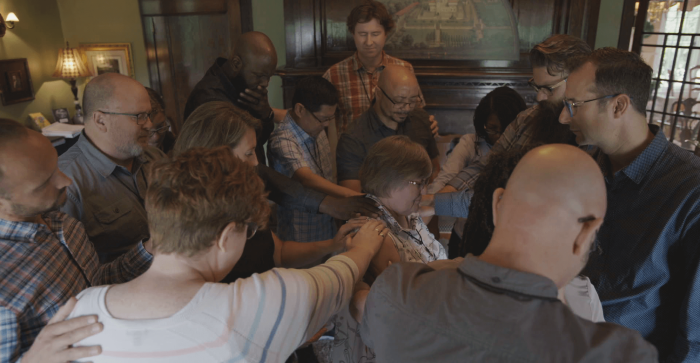‘Won’t You Be My Neighbor’ filmmaker creates doc on journey of 12 pastors seeking unity amid divisions

In a world fractured by deep ideological divisions, Nicholas Ma’s new documentary, “Leap of Faith,” seeks to answer the question of whether love can bridge seemingly unbridgeable divides.
Ma, son of world-renowned cellist Yo-Yo Ma and director of "Won’t You Be My Neighbor?," the celebrated film following the life of Fred Rogers, set out to find those few who might try.
His latest work follows 12 Christian leaders navigating faith and discord under the guidance of the Rev. Michael Gulker of The Colossian Forum, a pastor dedicated to building unity amid differences. The organization has the stated aim of equipping “Christians to think, act, and lead more like Jesus in the midst of conflict in their families, communities, churches and institutions.”
The film opens with a familiar sentiment — a longing for something lost. Reflecting on “Won’t You Be My Neighbor?,” Ma recalled that after screenings, audiences often asked, “Where are the Fred Rogers of today?”
In the collective nostalgia for Rogers, known for his radical kindness and acceptance, Ma told The Christian Post he perceived a yearning for a Christian leader who could engage across differences with the gentleness and patience of a beloved neighbor.
“I felt like there was this kind of longing, this sense of nostalgia, even the sense that maybe that era has passed and people that are that thoughtful don't exist anymore,” he said.
And Ma’s answer to that question came in the form of Gulker’s retreats. Over a year, Ma documented the conversations and shared meals of 12 pastors — each with distinct, often opposing, theological and political beliefs. Yet Gulker's approach urged them to genuinely attempt to belong to one another to arrive at the radical idea of fellowship across differences.
“Relationship requires pain,” Ma reflects in an interview, drawing an analogy to marriage. “Part of being married is to give someone the opportunity to hurt you.”
In this sense, "Leap of Faith" challenges viewers to reconsider how we “love thy neighbor,” Ma noted, adding: “We talk a lot about ‘love thy neighbor’ right now, and I think what we forget is generally, we fulfill that by choosing our neighbors, not by loving the people around us better. And that challenge is really hard. There's a reason that we avoid it. So, to watch people try to do something really hard and improbable, to me, was fascinating.”
Ma recalled the initial apprehension of the pastors — many of whom had not ventured into such intense dialogue with those holding vastly different beliefs. Ben Camp Meyer, one of the pastors, admitted to feelings of emptiness and a need for renewal, anxieties shared in part by others in the group.
This openness from one prompted a cascade of honesty, and eventually, as Ma described it, “vulnerability became contagious.”
The film doesn't shy away from difficult topics — including sexuality, a subject Ma anticipated the group might avoid — unity, democracy and love.
According to Ma, it was in these areas of friction where the pastors leaned into difficult truths and exposed their deepest fears, standing as both witnesses and caretakers for each other's vulnerabilities.
“It’s the beauty of being willing to hear what you may not want to hear,” Ma explained. “To say, ‘Here’s who I am, and I’m afraid that this is the part you won’t like about me.’”
“Leap of Faith” does not resolve these issues. It doesn’t aim to. Instead, Ma said he wanted to capture the pastors’ commitment to wrestle with hard questions without compromising their beliefs or love for one another.
“Transformation is at the heart of the faith,” he said. “Hopefully, we are transformed. That doesn't mean that we've compromised. That doesn't mean that we've given up our values. It just means that by providing that space for the spirit to work, something transforms. And that, to me, is what's beautiful about it.”
One of the film’s closing lines, spoken by Gulker, distills its essence, Ma said: “You be who you are. I’ll be who I am, and we’re going to get through this together.” The filmmaker said he sees these words as a call to action.
“Generally, we only believe two of those things,” he said. “Either you have to change, or I do, or we go our separate ways. But there’s a profound leap of faith in believing all three: you be who you are, I [will] be who I am, and yet we belong to one another.”
It’s a radical idea in today’s climate of polarization and ideological entrenchment, Ma said, stressing that faith requires the humility to admit that one cannot always see the path forward and that the future may yet hold the “possible we cannot see.”
In “Leap of Faith,” Ma said he intentionally offers no tidy answers, but instead invites viewers to witness the spirit at work among 12 pastors taking a leap of their own — trusting that their faith, their fellowship, and their willingness to remain in dialogue will be enough to bridge the distances between them.
“I sometimes hear from people, ‘Oh, someone didn't make this argument,’ or, ‘Why didn't they quote this piece of Scripture?’” he said. “Well, that would be if I were writing this as a sermon, or if I were writing this as an article, we could talk about that. But that's not what this was. This was what was experienced by these 12 pastors and Michael and his team. And how do we honor that and witness that? And in witnessing that, how does it maybe just illuminate the possible a little bit more?”
Leah M. Klett is a reporter for The Christian Post. She can be reached at: leah.klett@christianpost.com





























